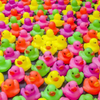BPA Should we still be worried?
September 03, 2015


We've all heard of Bisphenol-A (BPA) and phthalates - those chemicals that wreak havoc on the health of our families. The question we need to ask ourselves is - with so much attention already directed on these chemicals, do we still need to be worried? Since BPA and phthalates can be found pretty much anywhere, the answer is YES. The good news is that with many more consumers being aware of the harm these chemicals cause, a lot of product manufacturers are being more cautious with their material selection and opting for better and safer choices.
Other than making informed choices when selecting products, there are a few things we can to do limit exposure to BPA:
- Replace any old bottles (baby bottles, water bottles) and food containers made of polycarbonate and replace with glass, stainless steel, or BPA-free plastic.
- Do not heat food in plastic regardless of BPA-free plastic or not.
- Avoid canned foods as well as canned pre-made baby formula - these cans typically use a protective liner made of BPS-based epoxy. Instead choose fresh or frozen foods whenever possible. If formula feeding, opt for powdered baby formula.
- Skip getting fillings or dental work done while pregnant or nursing.
- Always wash hands after handing money and/or touching receipts and definitely prior to eating.
Ways to avoid phthalates:
- Eliminate teethers, bibs, place mats, and shower curtains made with PVC and replace with safer alternatives.
- Choose personal care products that are labeled phthalate-free. Double check ingredient lists to make sure they don't contain diethyl phthalate (DEP), Di (2-ethylhexyl) phthalate (DEHP) and dibutyl phthalate (DBP).
- Same with household cleaning products - plant-based, unscented products are good options or make your own with vinegar and baking soda.
- Avoid scented candles and air fresheners since many of them often use phthalates to give them their fragrance.
- Avoid products or packaging marked with #3 recycling code, V or PVC.
It can be overwhelming to wade through all the different chemicals to avoid, so I choose to eliminate the culprits from things that impact my family directly. Since I have two young kids, I make sure to be super selective about items that go into their mouths, which translates to items that touch their food. I am also careful about what goes on their skin (shampoos, soaps, lotions, and sunscreen) and things that could emit harmful fumes in the are around them (yup, no more scented candles or air fresheners in our house). It's all about making small yet impactful changes.
Leave a comment
Comments will be approved before showing up.

